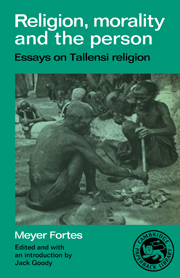Book contents
- Frontmatter
- Contents
- List of figures
- Introduction by Jack Goody
- 1 Divination: religious premisses and logical techniques
- 2 Prayer
- 3 Ritual festivals and the ancestors
- 4 Ancestor worship in Africa
- 5 Ritual and office
- 6 Totem and taboo
- 7 Coping with destiny
- 8 Custom and conscience
- 9 The first born
- 10 The concept of the person
- Endpiece: sacrifice among theologians and anthropologists
- Notes
- References
- Index
1 - Divination: religious premisses and logical techniques
Published online by Cambridge University Press: 13 October 2009
- Frontmatter
- Contents
- List of figures
- Introduction by Jack Goody
- 1 Divination: religious premisses and logical techniques
- 2 Prayer
- 3 Ritual festivals and the ancestors
- 4 Ancestor worship in Africa
- 5 Ritual and office
- 6 Totem and taboo
- 7 Coping with destiny
- 8 Custom and conscience
- 9 The first born
- 10 The concept of the person
- Endpiece: sacrifice among theologians and anthropologists
- Notes
- References
- Index
Summary
Divination is a relatively clear-cut configuration of ritual action which embodies fundamental constituents of religious and magical systems and is easily accessible to repeated observation. It is a pivotal institution in very many of these systems the world over, and the diviner is a key functionary in the cult activities associated with them. This has been well known since antiquity. Greek and Roman omens and oracles, Hebrew prophecy and Oriental astrology are well-known examples. But I do not want to discuss divination in general. What I have in mind is to give some account of the configuration and technique of divination, as I have witnessed and participated in it among the Tallensi of Northern Ghana, in concrete illustration of the thesis I shall put forward.
To make my case, I must first indicate what I understand by the concept of ritual. Anthropologists are not all of one mind on this. In its colloquial sense the term has come to be widely used to include almost every kind of stylized or stereotyped verbal and motor behaviour that is habitual or customary in a given social environment. Journalists write of the ‘ritual’ of cricket, of Parliament, of the law, of taking a university degree. More commonly and narrowly, the word is associated with such things as the Christian communion service, coronations, funerals, etc., etc. Among anthropologists the current vogue is to emphasize the ‘communication’ function of ritual.
- Type
- Chapter
- Information
- Religion, Morality and the PersonEssays on Tallensi Religion, pp. 1 - 21Publisher: Cambridge University PressPrint publication year: 1987
- 3
- Cited by



